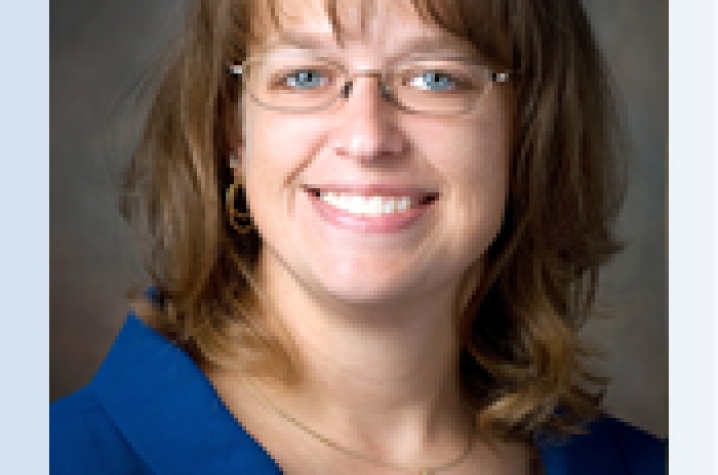Employee Education Benefit Pays Off for UK Staff Members
LEXINGTON, Ky. (July 1, 2015) — One of the many benefits of full-time employment at the University of Kentucky is the opportunity to take classes with tuition and activity fees waived.
The Employee Education Program (EEP) began in the fall of 1987 during the administration of then-UK President David Roselle. Initially, employees could only take classes at UK. In 1997, as part of the higher education reform bill (House Bill 1) passed by the General Assembly and signed by Governor Paul Patton, EEP was extended to all Kentucky public institutions. UK employees could attend another state institution and employees of other state institutions could attend UK.
All regular, full-time employees .75 FTE and above are eligible to take up to six credit hours in a given semester, usually the equivalent of two courses. For undergraduate courses, there is no tuition at any Kentucky public institution or activity cost when taking classes at UK. Any other fees (course and/or program fees), books, or expenses related to the class are the employee's responsibility. For graduate courses at either the master's or Ph.D. level, there is no tuition charge, although certain aspects of the benefit are taxable once a pre-determined threshold is reached.
"Employees can utilize the EEP to obtain the necessary education to facilitate the advancement of their career," said UK Chief Benefits Officer Joey Payne. "I encourage my employees to utilize the program. We have had benefits staff obtain master's degrees, and we have had staff with no prior college credits earn bachelor's degrees. This program opens doors for many employees. I earned my MBA utilizing the EEP, so I am certainly a strong advocate."
Two current UK staff members who are utilizing the EEP benefit to pursue a master's degree in public administration (MPA) from the Martin School of Public Policy and Administration are Sheila Brothers and Tricia Coakley.
Brothers, who works in the Office of the University Senate Council, is the elected staff representative to the UK Board of Trustees (BOT) and serves as board secretary. Coakley is a research facility manager in the College of Engineering.
Brothers began working at UK as a part-time switchboard operator more than 20 years ago and eventually gained a full-time position. She first utilized the EEP benefit to complete her undergraduate degree. At a point where she would like to further advance her career at the university, Brothers met with representatives of several graduate studies programs and decided the Martin School was the best fit for her.
"I love UK and wanted to find a way to advance here, not just advance anywhere," Brothers said. "The Martin School intrigued me because I am interested in public service."
Brothers said that what she is learning in the MPA program already is having a positive impact on her current job and how she approaches her daily work.
"Incredibly so," she said. "I now have a much better understanding of statistical information and can see through vapid figures or misleading charts. Most recently, my financial management course has given me a much better understanding of the spreadsheets I see as a trustee and a better grasp of UK's endowments and investment strategies."
Brothers started out in the MPA program by enrolling in just one class her first semester, but took on the challenge of two classes during this past spring semester. She credits her husband and children for being supportive and points to one family member for being especially helpful.
"If I had to pick one person who has made this all possible, it would probably be my mother-in-law," Brothers said "She is always there and willing to do little things and big things to help our household run smoothly."
Coakley, who has worked at the university for 13 years, actually transferred to UK from Western Kentucky University (WKU), where she was pursuing a graduate degree in the natural sciences.
"It was very important that the employment opportunity I received from UK would allow for the continuation of my graduate studies," Coakley said. "It was a seamless transition."
Coakley said she finds continuing her education and learning new skills to be among the more rewarding aspects of her life. As her time at UK went along, she began searching for a program that would provide business management education specifically adapted to the public sector, where service outcomes are the measurement of success, rather than profit margins.
"The Martin School faculty have taken what began as my simple quest for greater understanding of current policies and procedures and transformed it into confidence and skill to serve as a leader of beneficial change," said Coakley. "The MPA curriculum has already been of great benefit in both my current job and my volunteer activities. Here at the university, my input has been instrumental in the development of a new program proposal and I was given the opportunity to conduct a policy analysis to help my department achieve its objectives. And I have used the management and fundraising skills learned through my Martin School classes to support a local nonprofit organization, which has resulted in my appointment to its board of directors."
The Martin School's faculty and administration welcome UK employees who enroll in their programs.
Eugenia (Genia) Toma, the Wendell H. Ford Professor of Public Policy and director of graduate studies in the MPA and MPP (Master's of Public Policy) programs in the Martin School, said, "Students in the work force enrich the classroom experience for everyone — other students and faculty. The nontraditional students bring the workplace into the classroom by sharing their examples and applications of the theories presented."
The Martin School master's programs are structured so that they are accessible to people who don't have a 'traditional' student's schedule, with many classes available in the evenings.
On a related note, UK Human Resources policy dictates that with supervisory approval, employees may take time out from their regular work schedule in order to attend one class each semester via EEP, provided they make up the work time missed.
Both Brothers and Coakley are enthusiastic in encouraging their fellow UK employees to take advantage of the opportunity to attend tuition-free classes at the university.
"I'd say 'use it!' The benefit is too valuable to let it lie on the table, unused," said Brothers.
"The EEP program is one of the most valuable benefits offered to UK employees," Coakley said. "With college education becoming mandatory in the job market and tuition rates increasing nationwide, I think that all staff members should take advantage of this opportunity to attain a degree without incurring debt."
Recent figures supplied by the UK Employee Benefits office show that many current employees indeed are heeding the advice of Coakley and Brothers.
In the fall semester of 2014, 1,620 employees took advantage of the EEP benefit and that number grew to 1,629 in spring semester 2015.
The Family Education Program (FEP) is a separate option for family members of full-time UK employees. If an employee is not utilizing the EEP in a given semester, a family member can receive a tuition discount for that semester under the FEP. During the 2014-15 academic year, an average of nearly 600 employees were taking advantage of the FEP benefit.
For more information on the EEP and FEP benefits available to UK employees, visit http://www.uky.edu/hr/benefits/more-great-benefits/employee-family-education-program.
CONTACT: Carl Nathe, 859-257-3200; carl.nathe@uky.edu.






